US Presidential nominee Donald Trump told supporters at a rally in Florida last week, “Christians, get out and vote! Just this time – you won’t have to do it any more…It’ll be fixed! It’ll be fine.”
Many condemned Trump’s blatant declaration to undermine democracy. Democrat Adam Schiff said democracy was on the ballot. “If we are to save it, we must vote against authoritarianism.”
There may be a natural assumption that Americans value democracy too highly to allow one party, or one man, to destroy it.
In our recent Ipsos poll on economic systems change in G20 countries we canvassed views of different political systems. In the US, 80% of Americans thought democracy was a very good or fairly good way to run a country. This was by far the most supported form of governance in our list. It should be bad news for Trump if he thinks people will support an authoritarian system.
But this is only half the story. When we asked about support for an authoritarian system, a worrying 41% of Americans think “having a strong leader who does not have to bother with parliament or elections” is a very good or fairly good system. This view gained slightly more support among men (45%) than women (37%). Higher earners and younger people were most likely to support a more authoritarian style.
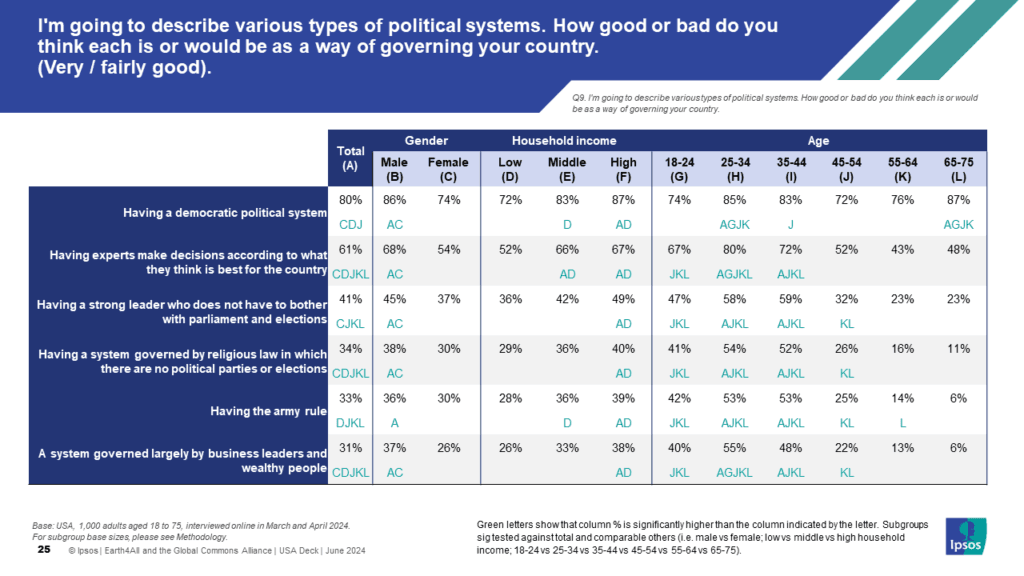
If an authoritarian leader came to power in the US tomorrow, this way of governing might gain support from approaching half of the electorate.
We asked about other forms of governance. A theocracy led by religious leaders received support from one in three Americans (34%) while army rule received similar support (33%).
The system of governance that received the least support was “a system governed largely by business leaders and wealthy people”. Just 31% of people think this is a very good or fairly good system. This is somewhat ironic given that the United State shares many plutocratic characteristics that may well be undermining public trust in democracy. By some margin, men support a plutocracy more than women (37% vs 26%) and younger people are much bigger supporters than older folk.
The way we worded the question ensured we were not pitting democracy, theocracy, plutocracy and authoritarianism against one another (which would show something else that is also useful). Rather, by asking the same question about each form of governance the survey reveals that many people who profess strong support for democracy can at the same time support other systems, or at least not reject them outright. At the very least it tells us that democracy must be defended in the court of public opinion day in and day out.
One reason for this ambivalence towards democracy may be related to trust in government.
Do Americans trust their government to take decisions that benefit the majority?
We asked about trust in government to make decisions that benefit of the majority of people. 39% of Americans believe the government can be trusted. Again, men have greater trust than women. Nearly half of men trust the government while just one third of women do (46% vs 33%). We also asked if Americans trust the government to make decisions that benefit people 20 or 30 years from now. Just over one third of Americans trust the government (37%) but here the gender gap is even wider: 45% of men but just 29% of women.
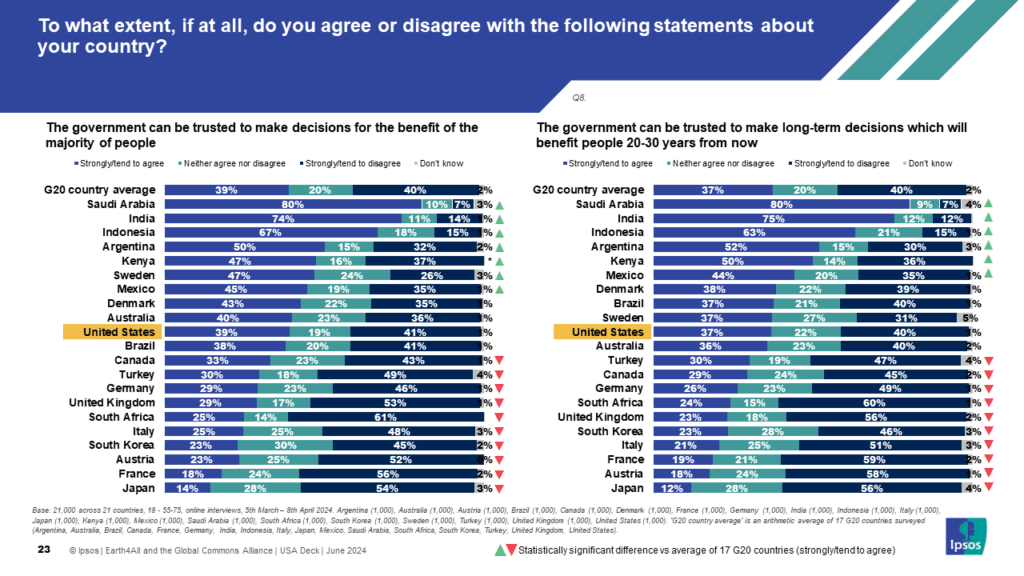
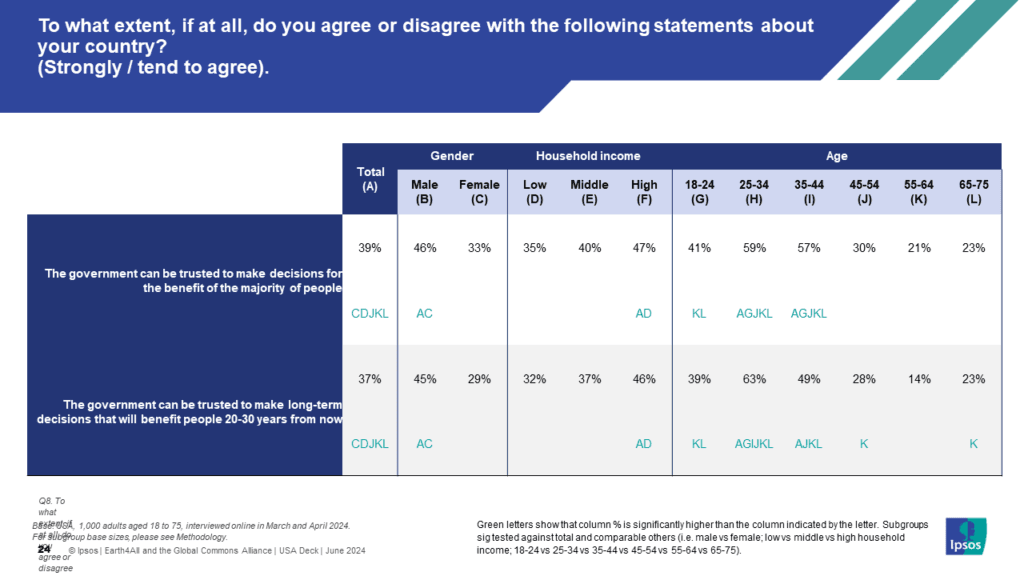
The US election has inevitably become highly charged. Do people feel things will improve in future, or worsen?
Will social unrest become more common in the future?
One in three Americans (32%) feel social unrest will become more common in future. This is nearly double the number of people who feel it will become less common (17%). Around half the country imagine there won’t be much change to today.
Do Americans support political reform?
We were also interested in people’s attitudes to political reform. At Earth4All we argue that a just transition to sustainability requires both economic transformation and political transformation. Trump also advocates for complete political reform (“Drain the swamp”). But do Americans support political reform? According to our data, 18% of Americans think the political system needs complete reform and a further 40% feel it needs major changes. This is a strong majority of 58% with just 8% feeling the system is working fine and requires no reform.
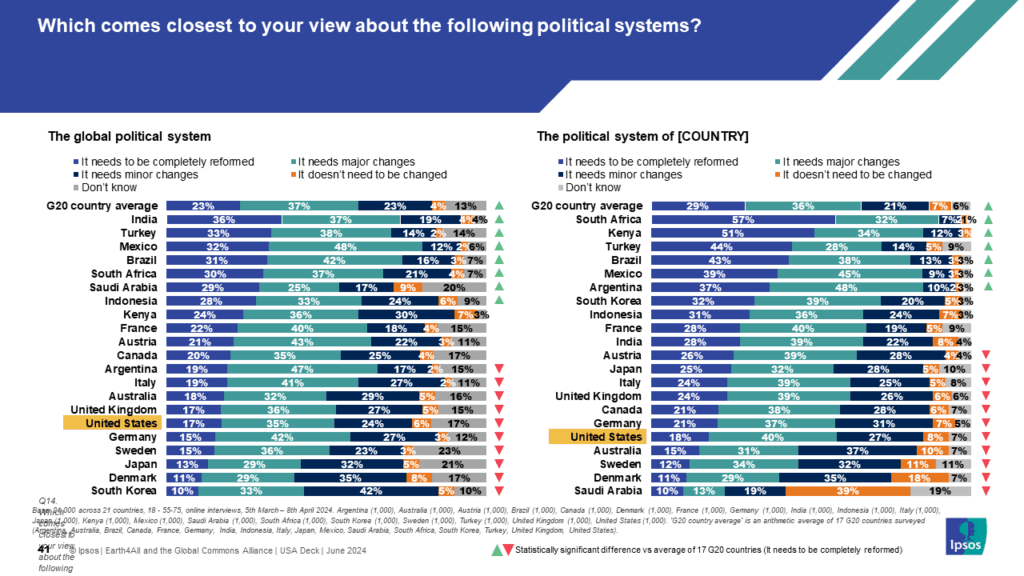
This finding is significant. Only Trump and his Republican party are advocating for large-scale reform. Without a strong vision for reform, Democrats may be handing votes to Trump.
Are Americans optimistic about their future?
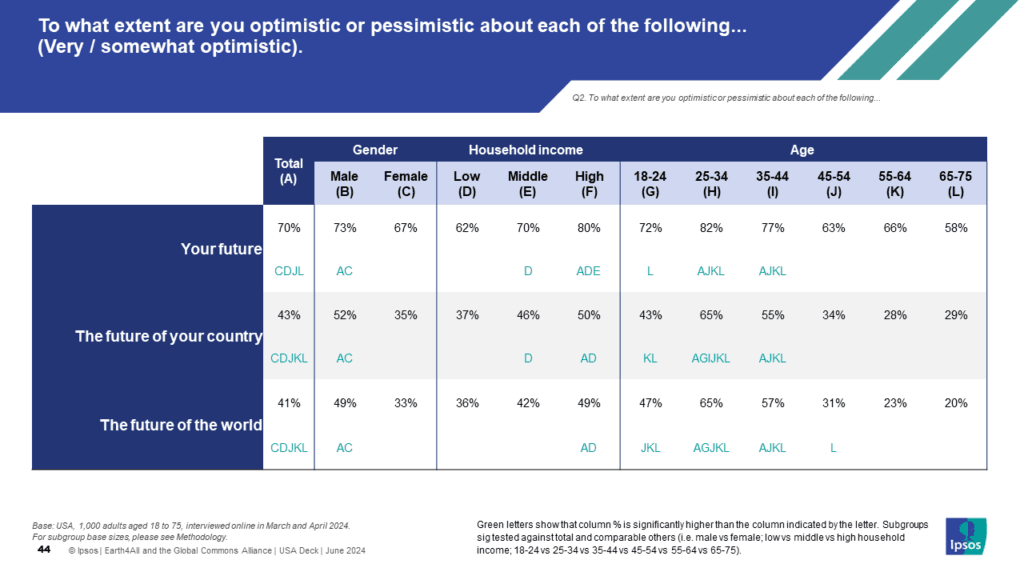
In the “land of opportunity” in a big election year, we wanted to get a snapshot of Americans’ optimism or pessimism about the future. 70% of Americans are optimistic about their own future. Men are slightly more optimistic than women (73% vs 67%). However, people are less optimistic about the future of their country. 52% of men are optimistic about the future of America but just 35% of women. The implications of these findings are profound. While democracy remains the preferred system of governance for most Americans, substantial support for authoritarianism and other non-democratic systems signals a precarious landscape. This ambivalence, coupled with low trust in government and a widespread desire for political reform, strongly indicates that the US is at a critical juncture. As the nation heads into a pivotal election, for democracy to thrive it must be actively defended and revitalised to address the underlying dissatisfaction
Explore the full results, including breakdowns by country, of the Earth for All 2024 Survey.



